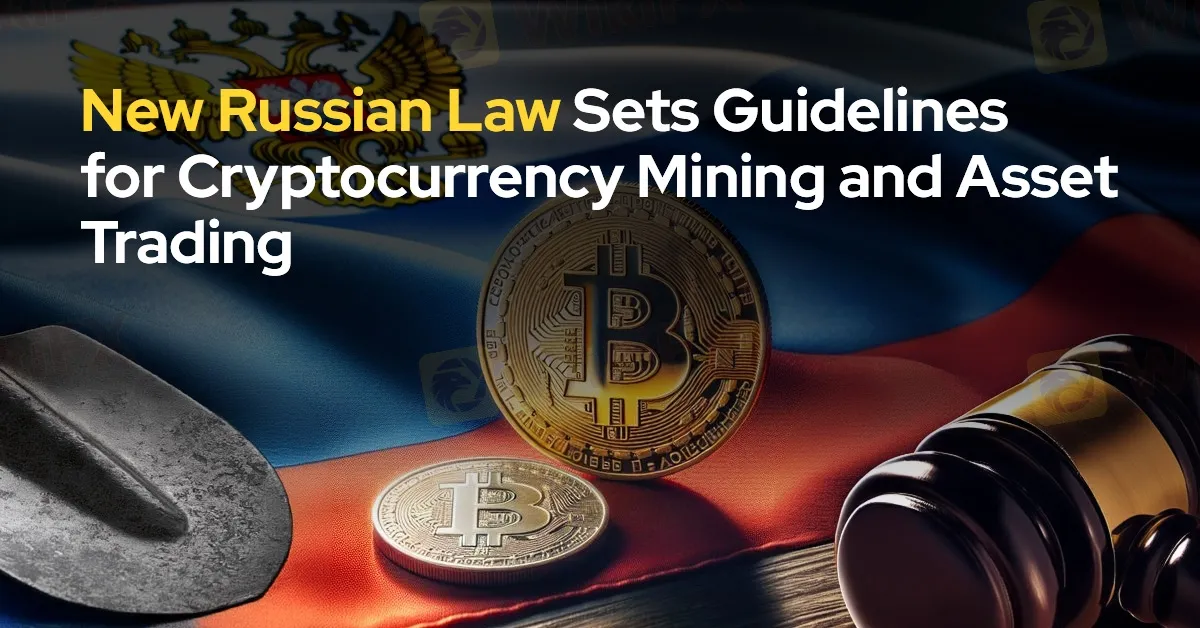New Russian Law Sets Guidelines for Cryptocurrency Mining and Asset Trading
Abstract:Russia has taken a significant step in its approach to digital assets by officially legalizing cryptocurrency mining. The new legislation, signed into law by President Vladimir Putin, establishes a detailed legal framework for regulating cryptocurrency mining and outlines the rights and responsibilities of those involved in the sector.

Russia has taken a significant step in its approach to digital assets by officially legalizing cryptocurrency mining. The new legislation, signed into law by President Vladimir Putin, establishes a detailed legal framework for regulating cryptocurrency mining and outlines the rights and responsibilities of those involved in the sector.
Published on Russias official legal information portal, this new law brings clarity to the previously unregulated realm of cryptocurrency mining. By officially recognizing mining as a legitimate economic activity, the Russian government integrates it into the broader economic framework, rather than treating it merely as a tool for issuing digital currency.

The legislation stipulates that only Russian legal entities and registered individual entrepreneurs can legally engage in cryptocurrency mining. However, individual miners can operate without registration as long as their energy consumption remains within government-set limits. This provision allows smaller-scale miners to continue their activities with fewer formalities, while larger operations will face more stringent regulations.
In addition to legalizing mining, the law permits the trading of foreign digital financial assets on Russian blockchain platforms. Nonetheless, the Bank of Russia retains the authority to ban certain assets if they are considered a threat to the countrys financial stability. This cautious approach reflects the government's attempt to balance fostering innovation with safeguarding the financial system.
The legislation also imposes strict rules on cryptocurrency advertising and promotion. It bans the offering of digital assets to an unrestricted audience, aiming to curb the widespread promotion of potentially risky investments.
Furthermore, the law provides for the possibility of banning cryptocurrency mining in certain regions or territories, giving the government the flexibility to regulate the industry according to local conditions.
President Putin has underscored the significance of regulating cryptocurrencies and digital assets as a key area for economic growth. In a recent government meeting, he emphasized the need for Russia to capitalize on this opportunity and create a strong legal framework to support the development of digital assets both domestically and in international trade.

Read more

Former Alameda Executives Hand Over Assets in FTX Creditor Recovery Effort
Amid ongoing efforts to recover assets for creditors of the defunct crypto exchange FTX, Sam Trabucco, former co-CEO of Alameda Research, has agreed to forfeit high-value assets, including two San Francisco properties and a yacht. According to a court filing dated 3 November, the combined value of these assets reaches approximately $11.2 million — with the properties estimated at $8.7 million and the 53-foot yacht at $2.5 million.

Tradeweb and TSE Partnership Enhances Access to Japanese ETFs
Tradeweb and Tokyo Stock Exchange partner to improve ETF liquidity for global investors, offering streamlined access and competitive trading in Japan’s ETF market.

Bitget Wallet and Foresight Ventures Launch $20M Fund for Telegram Mini Apps
Bitget Wallet and Foresight Ventures unveil a $20M fund to fuel Telegram Mini Apps, aiming to boost innovation and support developers in the TON ecosystem.

Binance Ordered to Unmask Account Holder in €186,000 Crypto ‘Pig Butchering’ Scam
In a significant ruling, a court in The Hague has ordered the cryptocurrency exchange Binance to disclose personal information of an account holder implicated in a major dating app scam. This directive follows a case involving a Dutch woman who fell victim to a “pig butchering” scam, leading to a loss of nearly €186,000 (approximately $200,000 USD) in what she believed to be a legitimate cryptocurrency investment.
WikiFX Broker
Latest News
Is WesternFX a Reliable Broker?
Why Do Experienced Traders Care About Forex Spreads?
ATFX Expands LATAM Presence with New Mexico Office
CySEC Warns against Public Review Websites
Former Alameda Executives Hand Over Assets in FTX Creditor Recovery Effort
Tradeweb and TSE Partnership Enhances Access to Japanese ETFs
ThinkMarkets Expands Mobile Integration with TradingView
Binance Ordered to Unmask Account Holder in €186,000 Crypto ‘Pig Butchering’ Scam
Will Trump’s Second Term Drive Economic Growth Through Tax Cuts?
InstaForex Lucky Trader Contest
Rate Calc
